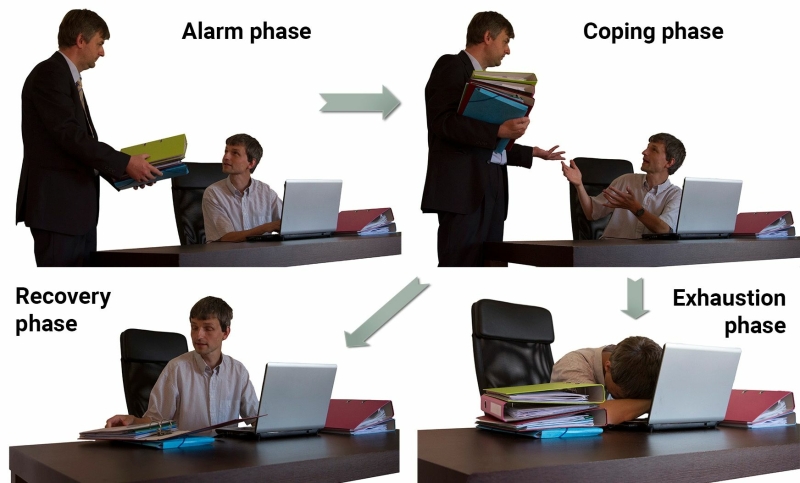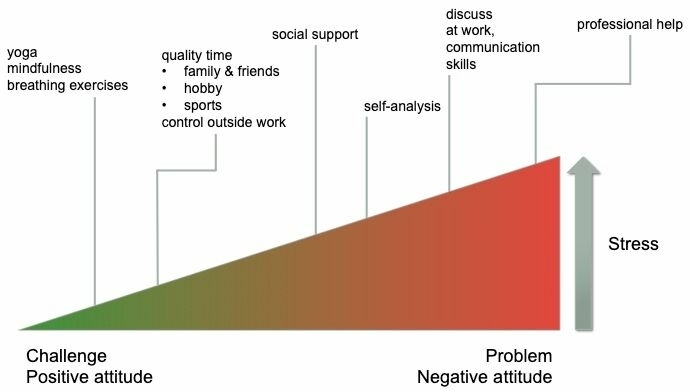
Stress at work is something that almost everybody will experience during his professional career. Work demands, problems with clients or colleagues, or job dissatisfaction in general all evoke stress. But what is stress exactly, and how can you best protect yourself from stress at work?
Understanding what stress really is
Before you can start to effectively reduce stress at work, it is imperative to know what stress precisely is. Stress is a condition of the body that prepares for immediate action to deal with a threat. It occurs essentially in every animal living on the planet. In humans and vertebrate animals (animals with a solid backbone), stress reactions in the body are very similar. Also, the effects of stress on health and mental wellbeing are very similar in animals and humans.
Biologists and psychiatrists have done much research on stress, and found that stress will provide you with instant energy to deal with a threat. Be it a predator on the prairie or a nasty boss in the office. This extra energy will lead to the so-called “fight-or-flight reaction”, which allows you to either engage yourself in active behavior to deal with the threat, or to run away from it.
 Stressful encounter between a dog and a cat. Both show defensive, stress-related behavior (the dog backing off, the cat being aggressive). Defensive behaviors are the consequence of stress reactions in the body. These reactions also occur in humans when they are stressed at work. Image by Peretz Partensky, San Francisco, USA, CC BY-SA 2.0.
Stressful encounter between a dog and a cat. Both show defensive, stress-related behavior (the dog backing off, the cat being aggressive). Defensive behaviors are the consequence of stress reactions in the body. These reactions also occur in humans when they are stressed at work. Image by Peretz Partensky, San Francisco, USA, CC BY-SA 2.0.
Good stress and bad stress
Stress is thus important for successfully dealing with threats. It enables you to solve problems, so that you can then return to your normal, everyday life. So, if stress is first and foremost something good, where does all the negativity about stress come from?
The problem with stress is that when it persists for too long, or becomes repetitive, it becomes damaging to your health. Stress becomes chronic. In severe cases, it can even lead to death. This is because when you are in a condition of stress, investment processes in your body are scaled down. For example, your immune system that fights off invading bacteria and viruses, will be weakened. Also, the hormones that are being released during stress increase the risk for developing cardiovascular disease, mental problems, sleep deprivation, autoimmune diseases and asthma.

Bad stress will occur when you are not able to deal with a threat or a problem successfully, or when you are repeatedly exposed to threats and problems. These situations arise frequently at the workplace. Think for instance about long working hours, a demanding boss, or a bad atmosphere amongst colleagues. These are all difficult to deal with and cause a lot of stress.
The three phases of stress
Stress is divided into three phases that describe the start of the stress, the way stress makes you cope with a problem or a threat, and the final outcome at the end of the stress.
The alert or alarm phase, in which someone becomes alert to the threatening event (which is called the “stressor”). In animals, this can be the approach of a predator or of an aggressive conspecific that wants to fight for a food source. At work, for example, this could involve a troublesome client entering the office, or your manager coming in with an enormous amount of work. Stress reactions in the body will be switched on.
The coping phase, in which the body reacts to the stressor by fleeing, fighting or adapting. Depending on the nature of the stressor, the brain and other particular organs are activated. If the stressor is a hungry predator, the brain will send a signal to the leg muscles so that animals can run and escape. The heart will beat faster and breathing will be accelerated to quickly send oxygen-rich blood to the muscles. If the stressor is a disproportionate amount of work that your superior has given you, it is your brain that will do most of the work, considering, for example, how to communicate with your superior to reduce the amount of work. In this phase, the body is in a state of stress that helps to deal, or to cope, with the stressor.
The third phase can have two outcomes. The first is the recovery phase, when an animal or human has successfully dealt with the stressor during the coping phase. In this case the individual is adapted to a new situation or the threat has disappeared. The condition of stress will end, and the body will function as before. If the stressor turns out to be too strong and remains present, the exhaustion phase occurs. The coping phase has then not been able to function sufficiently, so that the individual cannot cope with the stressor. The exhaustion phase leads to illness or burn-out, and is therefore the first step towards absenteeism due to work-related stress. The body has entered into a condition of chronic or prolonged stress.
 The three phases of stress. Stress starts with the alarm phase, for instance when you see your boss coming in with a tremendous amount of work. The stress gives you focus and energy to deal with the problem (the stressor) in the coping phase. If the coping phase is successful (reduction of workload in this example), you will enter in the recovery phase in which stress will disappear. If the coping phase is not successful, you will enter the exhaustion phase (burried in work) which becomes chronic and dangerous for your health. Stress management should be geared towards reducing this form of stress.
The three phases of stress. Stress starts with the alarm phase, for instance when you see your boss coming in with a tremendous amount of work. The stress gives you focus and energy to deal with the problem (the stressor) in the coping phase. If the coping phase is successful (reduction of workload in this example), you will enter in the recovery phase in which stress will disappear. If the coping phase is not successful, you will enter the exhaustion phase (burried in work) which becomes chronic and dangerous for your health. Stress management should be geared towards reducing this form of stress.
Some common causes of stress at work
Stress at work is very common, and is in fact the most common cause of absenteeism. Stress can be evoked in a number of ways, including (but not limited to):
Tight deadlines
Long working hours
Unbalance between time to spend at work and with the family
Bad atmosphere
Fear of being laid-off
Lack of control over your work
Reorganizations
Pressure to perform at optimal levels all the time
Unrealistic expectations from bosses, collaborators, or yourself
 Lack of time is a common source of stress at work.
Lack of time is a common source of stress at work.
Stress symptoms
Recognizing the signs that you are under too much chronic stress is important. This will allow you to take action and try to reduce stress. Be aware of the following symptoms of chronic stress:
Irritability
Feeling anxious and worrying a lot
Feelings of depression
Insomnia (sleeping problems)
Fatigue
Difficulties concentrating
Stomach problems
Tense muscles
Headaches
Loss of libido
Social withdrawal
Increased use of alcohol or drugs
It is important to realize that each of these symptoms is not specific to chronic stress. They can also occur under other conditions. You could consider them as warning signs, especially when you have several of these symptoms. It is important to consult with your physician to discuss your symptoms and to analyze together whether these symptoms may be the consequence of chronic stress.
 Fatigue is a symptom of chronic, or bad, stress. As with other stress symptoms, fatigue can also occur because of other reasons.
Fatigue is a symptom of chronic, or bad, stress. As with other stress symptoms, fatigue can also occur because of other reasons.
Recognizing stress in colleagues
Just as it is important to recognize yourself when you are under too much stress, it is also important to see when colleagues experience too much stress. You might indeed find that a stressed colleague is irritable, easily distracted and has a hard time concentrating, but there are also other, more subtle symptoms that you should be aware of.
Research has shown that chronic stress affects the way people communicate. Compare the following. People under low stress can process seven messages at a time, and recall the information contained in these messages in linear order (meaning they remember which message came first, second, third, and so on). People under high stress, on the other hand, can process only three messages at a time. They will recall only the most important information, or the message that came last.
Imagine what impact these communication deficits may have in a company. For example, when you have discussed the next steps in a project with somebody who is highly stressed, you will see that not all the work will be done in the way you agreed upon. Or that some tasks will not be performed. This is simply due to the fact that the highly stressed person genuinely does not remember what you discussed with him. So instead of getting angry, aggravating the stress levels in the already stressed collaborator, you should try to find out why certain things did not work out according to plan. Especially if such communication problems become more frequent. It could very well be that your collaborator is suffering from too much stress.
 You will notice that when your colleagues are under high stress, they will easily be distracted from work.
You will notice that when your colleagues are under high stress, they will easily be distracted from work.
What you can do to reduce chronic stress
It is not necessary to try to avoid stress completely. Remember, stress can be a good thing to help you deal with a problem or a threat. Stress will give you energy, focus and concentration that is necessary to do so.
Stress management should thus be geared toward the reduction of chronic stress. There are many things you can do to achieve this. Some techniques will be effective for some, but not for others. Your personality is an important factor in stress management. Also, the way you should manage stress depends on the severity of the stress. Relaxation techniques may be useful if the stress is not too strong, but if you are under high stress for a longer period of time, they won’t help much. In that case, you may want to consider seeking professional help from a psychologist or a psychiatrist.
1. Understand what stress really is
Understanding stress helps to understand why you are feeling stressed and why you should take certain actions to reduce chronic stress. Without such understanding, you will remain in the dark about which measures to take. Or you will not see the sense of why you should take certain steps to reduce stress. Thus, take some time to read about stress. No worry, the information you need is right on our website and in our community. No need to go anywhere else.
2. Try relaxation techniques
Relaxation techniques are probably the most commonly advertised methods to reduce stress. For instance, many people like to do yoga or meditation to reduce stress.Yoga and meditation are thought to relieve stress because you focus on the present moment. You are not distracted by unpleasant events at work. You will find inner peace and become calm.
Breathing techniques are likewise very popular. By controlling the way you breathe, you can overcome the faster breathing that you would experience during stress. High frequency breathing is a symptom of acute stress (good stress in most cases), which serves to supply the heart and skeletal muscles with oxygen. The extra oxygen is needed, because the heart and muscles work harder during stress. This is necessary for the fight-or-flight response. By forcing yourself to breathe calmly, you send a signal from the lungs to the brain that may override the sensation of stress. As a result, you will calm down.
It is important to note that relaxation techniques reduce stress for a short moment most of the time. Their benefit lies in the calming effect they may have, so that you can think more rationally about the problems that cause stress. Your negative thoughts are better controlled. This makes the possibility that you may find a solution more likely.
3. Invest in quality time
Spending time with family and friends is invaluable. And so is taking time for yourself. Take time to devote to your hobby, seeing friends, or doing fun things with your family. It will make your life much richer, with a healthy family life. You will benefit from a refreshed mind and feel more energized.
4. Search for control outside work
As mentioned earlier, lack of control over your work is a well-known and important cause of stress. If you don’t have control at work, it might help to look for a place outside work where you do have control to reduce stress. Think of organizing events at your local sports club, church, or do some voluntary work.
5. Reach out to colleagues, family and friends
When stress at work becomes a bit more severe, talk about it with colleagues, family members or friends. These should obviously be persons that you are feeling close to, and can trust. Scientific research has shown that getting social support is an effective means to reduce stress and anxiety. Even if the person you talk with does not have a solution for your stress, simply talking about it and feeling supported already help to calm you down.
6. Self-analysis
When you keep feeling stressed, it is advisable to analyze carefully for yourself what it is that causes the stress precisely. For this, you may first try relaxation techniques to get clear in your head. Then, you have to ask yourself the right questions, such as “when do I experience stress?”, “in the presence of whom do I experience stress?”, “which task do I feel uncomfortable doing?”. You could also keep a diary to keep track of how you are feeling during the day, and see when you feel stressed.
7. Improve communication skills
You may want to talk about your stress problems with your manager. It can be a daunting task to express how you feel about your work or the way you are being managed. Especially if keeping your job depends on the manager you have to talk with. Fortunately, there are certain communication skills that you can apply during the discussion with your boss.
The most important one is that you speak about your problems from your own perspective, using the “I message”. An example: “I notice that I have to report back to you after each little change I make to the protocol.” Then you continue with a description of the effect that has on you. “This gives me the feeling that you are checking on me constantly, and this suggests to me that you are not confident that I can do the tasks you assigned to me correctly. For this reason I feel under pressure all the time.”
By talking about what you observe and which effect that has on you, you do not directly criticize your manager. Nevertheless you convey what your problem is in a very clear way. So you are not tough on the person (your manager), but you are on the content of your message (your stress-related problem).
8. Prioritize and delegate
If you find yourself burdened by work, do the things that are urgent and important first. These should be your priority. Tasks that are not urgent, but important can wait. You can still consider doing tasks that are not important, but urgent, if you have the time. Tasks that are not important and not urgent go obviously to the bottom of your to-do list.
You might also want to delegate certain tasks if you can to colleagues or collaborators working for or with you in your team. This will free you up.
Try not to be a perfectionist. While striving for excellence is a virtue, you might be much better off if you manage to get your work done on time. More often than not, a quality of 95% will be just as much appreciated as 100%. Trying to get the last 5% right may be necessary at times, but keep in mind that this will cost a lot of time (which you often do not have).
9. Professional help
If stress becomes really debilitating, you should look for professional help from a psychologist or a psychiatrist. They use several methods to help you understand why you have stress. They will help you to ask the right questions, and can assess which personality you have. Personality can have a major impact on stress levels. For example, if you are an introvert, you may find it difficult to talk about stress-related problems. You will then not be able to find social support. Or maybe your personality shows many traits of neuroticism (negative emotionality), so that you experience many everyday concerns as stressful. Your psychologist or psychiatrist will help you to uncover all of this, and help you to reduce chronic stress.
It is important to try to reduce stress to protect your health. Apart from causing cardiovascular disease or weakening the immune system, chronic stress can lead to burnout. This is a mental state characterized by intense fatigue caused by work. A good night’s sleep is by far not sufficient to re-energize yourself. Burnouts are the consequence of untreated or unrecognized chronic stress, and takes many months to recover from. So, if you feel stressed, or if somebody close to you tells you you are under stress, take action and try to reduce stress.
 Effectiveness of stress management techniques depend on personality and the severity of the stress. On the left are those who have a positive attitude and see problems as a challenge. On the right are people who see problems as insurmountable problems. These people are more prone to stress. Typical stress relaxation techniques tend to work better for those who experience less stress (the green zone on the left). If the stress becomes severe, it is best to ask for professional help from psychologists and psychiatrists (red zone on the right). Understanding what stress is, is important to reduce stress at any severity level.
Effectiveness of stress management techniques depend on personality and the severity of the stress. On the left are those who have a positive attitude and see problems as a challenge. On the right are people who see problems as insurmountable problems. These people are more prone to stress. Typical stress relaxation techniques tend to work better for those who experience less stress (the green zone on the left). If the stress becomes severe, it is best to ask for professional help from psychologists and psychiatrists (red zone on the right). Understanding what stress is, is important to reduce stress at any severity level.
What employers and managers can do to reduce chronic stress in their company
Employers and managers can do many things in their organization to reduce employee’s stress. Some of these are:
Take distance to the actual work. Employees will then be more in control over their tasks, and will feel trust. So no micromanagement. This will also help managers to keep an overview over several projects that may be running simultaneously in a company. Managers can thus focus on the things that are important in the bigger context of the functioning of the company.
Assess together with the employees what could be improved to increase productivity or make processes more efficient. Everybody can have their say, so that everybody feels valued.
Do not overuse modern means of communication. Do not expect that employees should be reachable 24 hours per day, seven days per week. If you do, then employees remain alert all the time, and cannot relax. This drains the energy out of them, and is very stressful.
Leaders should back up their collaborators when the going gets tough with clients. This may be one of the most important roles of a leader.
If you have to criticize or correct a collaborator, you can use the “I message” technique. You package your critique in your observation of what you think is going wrong, and then say which effect this has on you or the company. Soft on the person, tough on the content.
Be very clear about the work that employees will be doing. Indicate the importance of the tasks at hand, and how they contribute to the overall mission and bottom line of the company.
 Employers should refrain from sending emails after working hours, nor should employees feel obliged to check their emails 24 hours per day.
Employers should refrain from sending emails after working hours, nor should employees feel obliged to check their emails 24 hours per day.
Why employers should care about stress management
It is in the interest of employers and managers to reduce chronic stress to the absolute minimum. This is because stress is extremely costly. Stress is the most common cause of absenteeism in industrialized countries, averaging to about 33% of all causes of sick leave.
In Germany, the biggest economy in Europe, 59 million working days per year are lost because of stress. This number amounts to 550 million in the world’s biggest economy, the United States. The loss of working days in the US is accompanied by a cost of 500 billion US dollars on a yearly basis.
Costs are caused by:
Absenteeism
Increased number of accidents
Medical costs
Reduced productivity
Investing in the reduction of stress will pay off. The relatively small costs to reduce stress will be compensated by the savings many times over.
Look at what it would mean for a small country like The Netherlands (or Holland as it is sometimes called) in Europe, with an economy that is estimated to be 25 times smaller than the one of the US. Recent research commissioned by the Dutch government has shown that a 1% reduction in absenteeism due to illness would save Dutch businesses 2.6 billion dollars per year. Moreover, healthy employees are more motivated and productive than stressed employees. A 1% increase in productivity would add a further 2 billion dollars to the Dutch economy. While these are already dazzling numbers for a small country like The Netherlands, imagine the benefits for much bigger economies such as that of the United States! If we extrapolate the data from the Dutch study to the US, which has a Gross Domestic Products (GDP) that is roughly 25 times that of the The Netherlands, a total benefit for the US economy would be almost 200 billion dollars per year! Just by reducing stress at work!
 Stress is costly. Companies would be wise to reduce chronic stress in their organization.
Stress is costly. Companies would be wise to reduce chronic stress in their organization.
Why employees have a stronger position than they think
Many employees are reluctant to talk about their stress problems at work. Talking about stress is a taboo for many people. Many think that stress is something for the weaker, and are afraid their managers may think they are not cut out for their work.
Nothing could be further from the truth. First, anybody can potentially experience too much chronic stress. Second, if you employ the “I message” to discuss your problems, your manager will be open to discuss your problems and try to find a solution.
Don’t forget, your employer hired you because you have certain competences that he or she was looking for to get the company forward. Your employer will not fire you on the spot when you discuss stress with him or her. Realize also that it is costly to replace an employee. It takes time before the new employee reaches the same level of productivity that you had. The new employee will furthermore need help from somebody more experienced in the company to get to know how things are done. This all costs time and money. It has been estimated that replacing an employee costs at least three months’ salary.
So you see, you as an employee may have a stronger position than you may have thought! Use it to discuss your stress-related problems or to negotiate better working conditions.
 Discussing problems related to stress often helps to come to an agreement between managers and their collaborators.
Discussing problems related to stress often helps to come to an agreement between managers and their collaborators.
Ready to take action to reduce your stress at work?
Over the years, scientists and psychiatrists make new discoveries about stress. Because of this, our knowledge about what stress is, what it does to body and mind, and about stress management is constantly increasing. To manage your own stress, it is important that you can have access to the latest information and insight about stress. The problem is that breakthroughs in stress research don't get much publicity in the mass media.
That’s because they’re reported in specialized medical and scientific journals intended for researchers and doctors such as Nature, Science, The Lancet and The New England Journal of Medicine. There is even a journal especially devoted to stress, as reflected by its name: Stress.
Or, in some cases, major discoveries are made in prestigious health centers in a particular part of the world, and receive little or no coverage in the media in other parts of the world.
In still other cases, highly respected psychiatrists and psychologists make major discoveries in clinical studies in their own practices. They report their findings to professional medical societies and in specialized conferences, but these discoveries often escape the notice of the mass media.
All of this leaves gaping holes in the information about stress that you should be getting. Yet these “under-reported” discoveries can be of tremendous importance to you and those you love.
That’s why we created Stressinsight. Being a scientist and a psychiatrist ourselves, we know about the major breakthroughs in stress research. We want you to know about them too, so that you can take action to reduce stress.
Until Stressinsight came along, if you wanted to try to keep on top of new developments and scientific breakthroughs, you would have to subscribe to a shopping cart full of professional scientific and medical journals and newsletters.
And you’d have to spend a king’s ransom for the privilege!
You might also have to get a medical or academic degree to understand many of these articles. But now that’s changed, thanks to Stressinsight. You can have access to all there is to know about stress and stress management in our course "Surmounting Stress". In Surmounting Stress we take you through all the steps that are necessary to reduce your stress. You will also become a member of the Stressinsight community, and you will have direct access to us, Erwin van den Burg and Ines Gomez, founders of Stressinsight. So why don't you check out the Stressinsight community today? Click on the sign up button at the top of the page, and follow the simple instructions. We hope to see you in the inside of Stressinsight!

